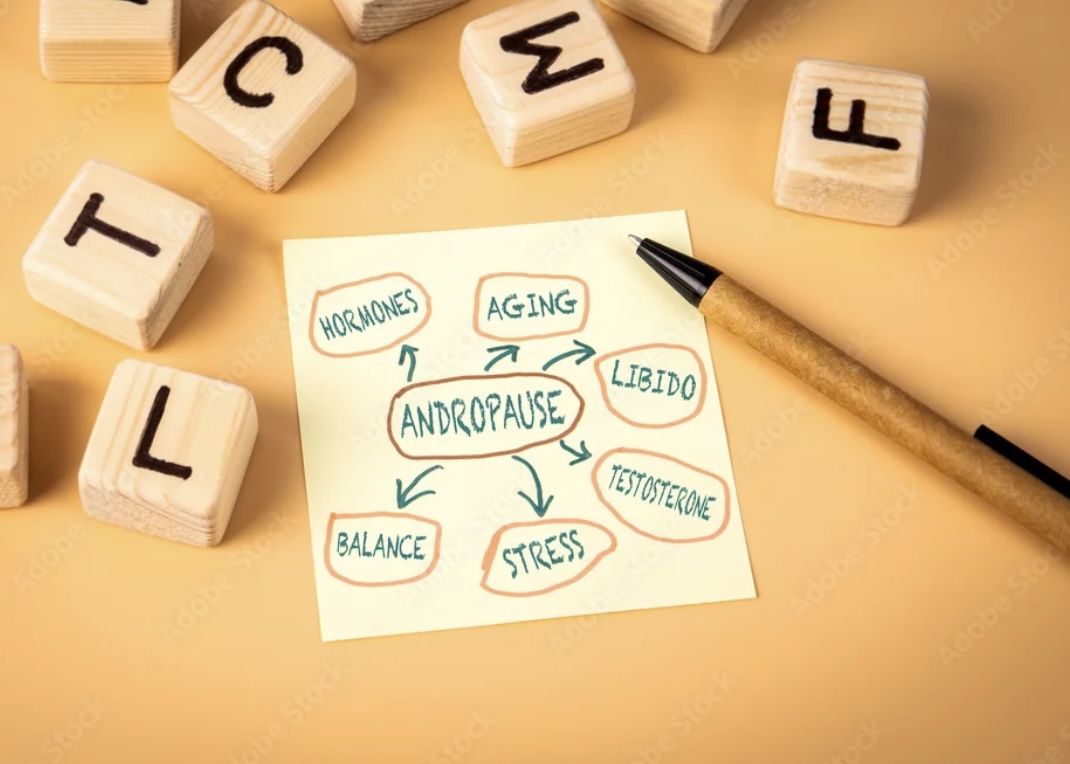
What Health Problems Should Men Watch Out For as They Age?
from TheWellnessSpace
Aging is a natural part of life, but it often comes with unique health challenges that require attention. While much focus has been placed on women’s health during aging—such as menopause—men also experience significant physiological changes that can impact their well-being. Understanding these changes and adopting proactive health measures is crucial for maintaining a high quality of life.
Here are the key health concerns men should watch out for as they grow older, along with the possible causes behind them:
1. Andropause (Male Menopause)
Andropause is characterised by a gradual decline in testosterone levels, typically starting around the age of 40.
Symptoms:
- Reduced libido
- Fatigue
- Mood changes (irritability, depression)
- Loss of muscle mass and strength
- Increased body fat
Possible Causes:
- Aging: Natural decline in testosterone production with age.
- Chronic stress: High stress levels can suppress hormone production.
- Lifestyle factors: Poor diet, lack of exercise, and obesity can exacerbate testosterone decline.
What to Do:
Regular check-ups with a healthcare provider can monitor testosterone levels. Lifestyle changes, such as exercising regularly, eating a balanced diet, and managing stress, can mitigate many symptoms. In some cases, hormone replacement therapy may be an option.
2. Cardiovascular Disease
Heart disease remains one of the leading causes of death among men.
Symptoms:
- Chest pain
- Shortness of breath
- Fatigue or dizziness
Possible Causes:
- Hypertension (high blood pressure): Often related to genetics, poor diet, or inactivity.
- High cholesterol: Caused by an unhealthy diet, lack of exercise, or genetic predisposition.
- Smoking: Damages blood vessels and increases plaque buildup in arteries.
- Diabetes: High blood sugar levels can damage blood vessels over time.
What to Do:
- Regular cardiovascular screenings to monitor blood pressure and cholesterol levels
- Eating a heart-healthy diet rich in whole grains, fruits, vegetables, and lean proteins
- Staying active with regular exercise
- Avoiding tobacco products
3. Prostate Health
Prostate issues, such as benign prostatic hyperplasia (BPH) and prostate cancer, become more common with age.
Symptoms:
- Frequent urination, especially at night
- Difficulty starting or stopping urination
- Pain during urination
Possible Causes:
- Aging: Prostate enlargement often occurs naturally with age.
- Family history: Genetics can increase the risk of prostate issues.
- Diet and lifestyle: A diet high in red meat and low in fruits and vegetables may contribute.
What to Do:
Routine prostate screenings, including PSA (Prostate-Specific Antigen) tests and digital rectal exams, can help detect problems early when they are most treatable.
4. Osteoporosis and Bone Health
Men are also at risk of osteoporosis, especially after the age of 50.
Symptoms:
- Weak or brittle bones
- Increased risk of fractures
Possible Causes:
- Low testosterone levels: Contribute to bone loss over time.
- Poor diet: Insufficient calcium and vitamin D intake.
- Sedentary lifestyle: Lack of weight-bearing activities weakens bones.
What to Do:
- Include calcium and vitamin D in your diet
- Engage in weight-bearing and resistance exercises
- Avoid excessive alcohol consumption and quit smoking
5. Mental Health Concerns
Conditions like depression and anxiety become more prevalent as men age.
Symptoms:
- Persistent feelings of sadness or hopelessness
- Loss of interest in activities
- Difficulty sleeping
Possible Causes:
- Stigma: Men are less likely to seek help for mental health concerns.
- Hormonal changes: Declining testosterone levels can affect mood.
- Life transitions: Retirement, loss of loved ones, or reduced social engagement can contribute.
What to Do:
Talking openly with a trusted friend, family member, or therapist can be a critical first step. Seeking professional mental health support or joining support groups tailored for men can also make a big difference.
6. Diabetes
Type 2 diabetes becomes more common with age, particularly in men who are overweight or have a family history of the condition.
Symptoms:
- Increased thirst and urination
- Unexplained weight loss
- Slow-healing wounds
Possible Causes:
- Poor diet: High intake of sugary or processed foods.
- Sedentary lifestyle: Lack of physical activity.
- Obesity: Excess weight increases insulin resistance.
- Genetics: Family history of diabetes is a significant risk factor.
What to Do:
A healthy diet, regular physical activity, and maintaining a healthy weight are key to preventing or managing diabetes. Regular blood sugar screenings are also essential.
7. Cancer Awareness
Beyond prostate cancer, other types of cancer, such as colorectal, lung, and skin cancer, pose significant risks to aging men.
Symptoms:
- Unusual changes in bowel or bladder habits
- Persistent cough or difficulty breathing
- Changes in moles or skin lesions
Possible Causes:
- Genetics: A family history of certain cancers increases risk.
- Environmental factors: Long-term exposure to carcinogens like tobacco or UV rays.
- Lifestyle factors: Diet, exercise, and smoking habits can influence risk.
What to Do:
- Get routine screenings, such as colonoscopies and skin checks
- Avoid smoking and limit sun exposure
- Maintain a healthy lifestyle
8. Hearing and Vision Loss
Hearing and vision changes are common with aging.
Symptoms:
- Difficulty hearing conversations or high-pitched sounds
- Blurred or reduced central vision
Possible Causes:
- Aging: Natural degeneration of cells in the eyes and ears.
- Noise exposure: Long-term exposure to loud environments can lead to hearing loss.
- Chronic conditions: Diabetes or hypertension can affect vision and hearing.
What to Do:
- Schedule regular eye and hearing exams
- Wear protective eyewear and avoid prolonged exposure to loud noises
- Use corrective devices, such as glasses or hearing aids, as needed
9. Weight Gain and Metabolic Changes
Metabolism slows down with age, making it easier to gain weight and harder to lose it.
Symptoms:
- Increased body fat
- Difficulty maintaining a healthy weight
Possible Causes:
- Hormonal changes: Declining testosterone and growth hormone levels.
- Reduced activity: Decreased physical activity as energy levels drop.
- Poor diet: Overeating or consuming processed foods.
What to Do:
- Prioritise a balanced diet with lean proteins, whole grains, and healthy fats
- Stay physically active with both aerobic and strength-training exercises
- Get enough sleep and manage stress
Conclusion
Aging is inevitable, but how we age is largely within our control. By staying informed about the causes of common health challenges and taking proactive measures, men can address potential problems head-on and maintain vitality throughout their later years. Remember, regular check-ups, a balanced lifestyle, and being attentive to your body’s signals are the keys to healthy aging.
TheWellnessSpace encourages men to embrace aging as an opportunity to focus on their health and well-being. Take the time to prioritise yourself—you’re worth it!
Would you like to learn more about specific aspects of men’s health? Let us know in the comments!
Recommended Reads for Your Journey:
Below, you'll find a carefully curated selection of books. Some of these are personal favourites that have inspired and enriched my life, while others come highly recommended by readers and critics alike. Whether you're seeking knowledge, entertainment, or inspiration, these books are worth exploring. If you choose to purchase through these affiliate links, I may earn a small commission at no extra cost to you—thank you for supporting my work!
The Mental Toughness Handbook: A Step-By-Step Guide to Facing Life's Challenges, Managing Negative Emotions, and Overcoming Adversity with Courage and Poise - by Damon Zahariades https://amzn.to/3Q6DG7s
Overcoming Andropause: Practical Solutions to Managing Testosterone Deficiency in Men - by Steve A. Griffin https://amzn.to/3ESnqob
Open When…: The Instant Sunday Times No. 1 Bestseller from the author of Why Has Nobody Told Me This Before? - by Julie Smith https://amzn.to/3Ev4ewA
Stop Overthinking: 23 Techniques to Relieve Stress, Stop Negative Spirals, Declutter Your Mind, and Focus on the Present (The Path to Calm) - by Nick Trenton https://amzn.to/42KxERh



